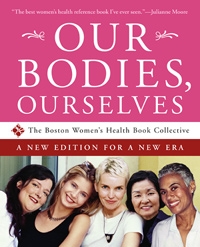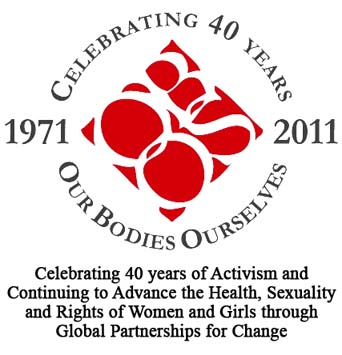 Changing Times, Continuing Need
Changing Times, Continuing Need
Much has changed since the late 1960s and early 1970s, when the group that became the Boston Women’s Health Book Collective first started to meet. Abortion is now legal (though threatened), and birth control options have increased; the AIDS epidemic has made safer sex a subject of public discussion; and lesbian and gay couples have the right to marry, at least in Massachusetts, USA. Many groups, including an active movement of women with breast cancer, have drawn new attention to environmental factors in disease and to the politics of research funding. More health care providers are women now, and doctors and medical researchers of both sexes tend to be more sensitive to and knowledgeable about women’s concerns than doctors of an earlier generation. Information on women’s health is widely available.
But the need for a book like Our Bodies, Ourselves remains. Too much medical care still focuses on the expensive “solutions” of drugs and surgery, rather than on prevention or management strategies such as good food and exercise, a clean environment, and safe working conditions. Too often, women’s life experiences, from childbirth to menopause, are seen as diseases to be treated rather than natural, healthy processes that sometimes have problems. And too many of us still don’t have the knowledge and resources to participate effectively in maintaining our health.
 Self-Help and Beyond
Self-Help and Beyond
This book offers individual women the tools to take care of ourselves, from eating well and becoming more physically active to learning how to cope better with stress. It provides helpful, clear information about substance abuse, heart disease, eating disorders, and many other conditions that women confront. A new chapter, “Navigating the Health Care System,” provides practical advice for getting the best care possible.
Yet Our Bodies, Ourselves is about more than self-help. Many aspects of our health, from workplace safety to sexual violence, are often beyond an individual’s control. Therefore, this book addresses the political, economic and social factors that affect our health and medical care: the industrial plants spewing pollution, the fast- food giants pushing junk food, the pharmaceutical companies unethically promoting drugs, the government dismantling our social safety net. We can change these conditions only by working together, sharing our stories with other women and advocating for policies and programs that protect the health of our families, our communities, and the world.
Many Women’s VoicesDespite some changes, this edition retains one of the distinctive traits of Our Bodies, Ourselves : the use of real women’s voices. These first-person stories have been collected from conversations, letters, and e-mail messages that spanned the globe.
Making Changes TogetherNo matter who we are, we often need both information and support to make healthy changes. If we are trying to get more exercise, for example, inviting a friend to share a morning walk may make it more fun. Similarly, if we are feeling overwhelmed as new mothers, we may want to join a play group with other families in the neighborhood. The same principle extends to issues beyond our individual well-being: By working together, we can bring about change and improve the health of our communities.
This new edition of Our Bodies, Ourselves serves as a first step on such paths, offering information, stories, and resources so that we can take care of ourselves – and one another. Heather Stephenson, managing editor, the Boston Women’s Health Book Collective introducing the 8th edition, July 2004, Boston, Massachusetts.
 Home | Aims and Objectives of Solidarity Philippines Australia Network | About Kasama
Home | Aims and Objectives of Solidarity Philippines Australia Network | About Kasama 
Search the SPAN Web